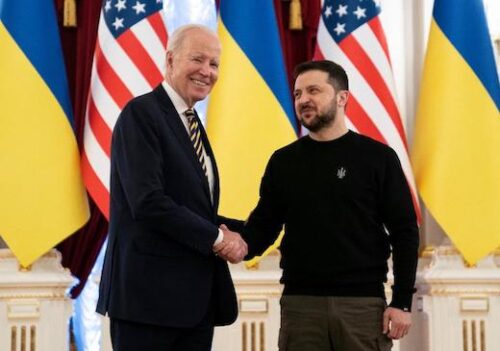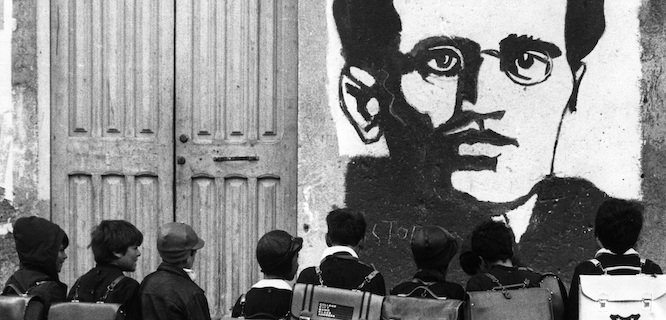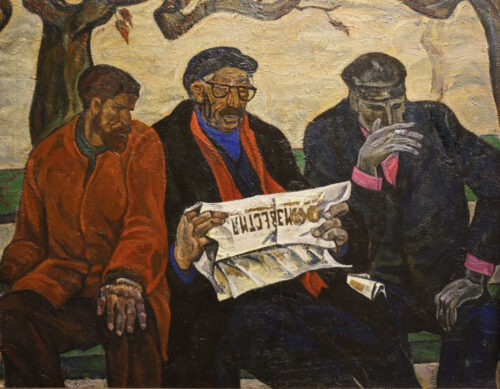The hypocrisy gets starker by the day. The same western media that strains to warn of the dangers of disinformation – at least when it comes to rivals on social media – barely bothers to conceal its own role in purveying disinformation in the Ukraine war.
In fact, the propaganda peddled by the media grows more audacious by the day – as two stories last week from the frontlines illustrate only too clearly.
Dominating headlines has been the environmental catastrophe created by the destruction of the Nova Kakhovka dam under Russian control. Flood waters from the Dnipro river have ruined vast swathes of land downriver from the dam and forced many tens of thousands to flee their homes.
Rightly, the wrecking of the dam is being called an act of “ecological terrorism” – the second major one associated with the war, following last September’s blowing up of the Nord Stream pipelines supplying Russian gas to Europe.
The costs associated with keeping this war going and avoiding peace talks so that Russia can be “weakened”, as Biden administration officials insist is the priority, have grown much steeper than most people could have imagined.
This is why a clear understanding of what is going on – and what interests are being served by fuelling the fighting rather than resolving the war – is so vitally important.
There have always been at least two narratives in Ukraine, even if western audiences are rarely exposed to the Russian one – outside of mocking commentary from western reporters.
In the immediate aftermath of the breaching of the Kakhovka dam, the BBC’s Moscow correspondent, Steve Rosenberg, visibly sneered as he reported that Russian media were insisting Ukrainian “terrorists” were behind the destruction. Russians, he suggested, were being brainwashed by their government and media.
He obviously failed to spot the irony that his own reporting, like that of colleagues, has served to reinforce the impression that the only plausible culprit in the dam’s ruin – despite a lack of evidence so far – is Moscow. Like the Russian media, Rosenberg has been hawking precisely the line his own government, and its Nato allies, want from him.
The BBC recently launched its Verify service, ostensibly to root out disinformation. In similar vein, western media have started appending to any report of Russian assertions the warning: “This claim could not be verified.”
Like a nervous tic, the media added just such an alert to Russian statements that large numbers of Ukrainian soldiers had been killed in what looked like the first stages of Kyiv’s so-called “counter-offensive”.
But no such warnings have been attached to Ukrainian President Volodymyr Zelensky’s claims that Russia blew up the dam.

Instead, reporters have been quick to regurgitate, unverified, his self-serving assertions that Moscow caused the destruction, supposedly to ward off the imminent counter-offensive, and that only western help evicting Russia from the areas it has occupied can prevent further “terrorist” acts.
As has so often been the case in this war, a thick pall of fog is likely to shroud what happened at the Kakhovka dam for the foreseeable future.
Which means that, if the media is determined to recycle speculation, what it should be doing at this stage – apart from keeping an open mind and investigating for itself – is applying the principle of “cui bono?” or “who profits?”
And if it bothered to do that properly, it might be far more reluctant to pin responsibility on Russia.
As Scott Ritter, a former US marine and United Nations weapons inspector, has noted, the chief beneficiary of the attack has been Ukraine, both militarily and politically.
After all, the western media has been documenting a series of fortifications – from trenches and mines to concrete spikes – that the Russian army has constructed along its front lines during the long wait for the Ukrainian counter-offensive. As has often been pointed out, they are so extensive, they can easily be seen from space.
And yet if it did blow up the dam, Moscow just washed away all its carefully built defences in a key area that Ukraine has set its eyes on recapturing – and just at the time Kyiv is said to be preparing for a dramatic military offensive.
Further, the swollen river behind the dam was a significant obstacle to Ukrainian forces crossing the Dnipro river for many tens of miles. It will be much less of a barrier now its waters have receded as the river gushes into the Black Sea. The dam explosion punches a surprise hole in a key, natural part of Russia’s defensive line.
Another critical concern for the Kremlin will be that the explosion poses a direct threat to water supplies to the arid Crimean peninsula – the first piece of Ukrainian territory Russia annexed. After a US-backed overthrow of Ukraine’s government in 2014, Russia made a priority of securing Crimea, long the site of a strategic, warm-water naval base.
And to top it all, Russia’s control of the Zaporizhzhia nuclear plant, upstream of the dam, has already come under renewed international scrutiny as questions are raised about Moscow’s ability to cope with a possible meltdown there as water supplies, needed for cooling, dramatically diminish.
There are political advantages in the dam’s destruction for Kyiv too. As Ritter observes: “There is a lot of ‘Ukraine fatigue’ right now. The world is just tired of Ukraine, of funding Ukraine… What Ukraine needs is a catastrophic event that rallies international support around Ukraine by blaming Russia for something big.”
The dam blast does just that. It thrusts the war back into the spotlight, it casts Moscow as a “terrorist” threat not just to Ukraine but to wider humanity, and it will prove a very effective tool to justify yet more weapons and aid to “weaken” Russia, even if Ukraine’s counter-offensive proves a damp squib.
The western media has not only largely ignored these factors, it has also drawn a veil over its own recent reporting that might implicate Ukraine as chief culprit in blowing up the dam.
As the Washington Post reported back in December, the Ukrainian military had previously considered plans to destroy the Kakhovka – in other words, to carry out what is universally understood now as a major act of ecological terrorism. At the time, the plan barely raised an eyebrow in the West.
The preparations included what now looks like a reckless “test strike” with a HIMARS missile – supplied courtesy of the US – “making three holes in the metal [of the floodgates] to see if the Dnieper’s water could be raised enough to stymie Russian crossings but not flood nearby villages”.
“The test was a success,” the Post reported Maj Gen Andriy Kovalchuk, a Ukrainian commander, saying back in December. “But the step [of destroying the dam] remained a last resort.”
Might that “test” or a similar one – possibly in preparation for a Ukrainian offensive – have accidentally undermined the dam’s integrity, making it gradually crumble from the pressure of the water?
Or could the dam’s destruction have been intentional – part of Ukraine’s offensive – spreading chaos to areas under Russian control, either to force Moscow to redirect its energies away from countering a Ukrainian attack, or deflect western public attention away from any difficulties Kyiv may have launching a credible military operation?
And why, anyway, would Moscow decide to destroy the dam, forfeiting control over water flow, when it could have simply opened the gates to flood areas downstream at any time of its choosing, such as when faced with an attempt to cross the river by the Ukrainian military?
These questions aren’t even being posed, let alone answered.
There has been an established pattern with the media during the Ukraine war, one that may serve as a guide in understanding how the story of the breaching of the dam will unfold.
The reticence of western outlets to ask basic questions, contextualise with relevant background, or pursue obvious lines of inquiry has been equally glaring in another act of ecological terrorism: the explosions on the Nord Stream pipelines back in September. They released enormous quantities of the prime global-warming gas methane.
Again, the media spoke as one. First, they echoed western officials in ascribing the explosions to Moscow, without a shred of evidence and even though the blasts were a huge blow to Russia.
The Kremlin lost the bountiful income stream that came from supplying Europe with natural gas. Meanwhile, diplomatically, it was stripped of its chief leverage over its biggest energy customer, Germany – leverage it might have used to induce Berlin to break with the West’s sanctions policy.
All of this was hard to obscure. Soon the western media simply dropped the Nord Stream story entirely.
Interest surfaced again only much later, in March, when the New York Times and a German publication, Die Zeit, published separate and quite preposterous accounts, based on unnamed intelligence sources.
According to these accounts, a group of six rogue Ukrainians chartered a yacht and blew up the pipelines off the coast of Denmark in a James Bond-style mission. The story was widely amplified by the western media, even though independent analysts ridiculed it as wildly implausible and technically unfeasible.
The problem the media has faced is that a very much more plausible account of the Nord Stream blasts had already been produced by the legendary investigative journalist Seymour Hersh in February. His unnamed intelligence source offered a far more credible and detailed account, and one that blamed the US itself.
The circumstantial evidence for US responsibility – or at least involvement – was already substantial, even if the media again ignored it.
From Joe Biden downwards, US officials either expressed a determination beforehand to stop more Russian gas from reaching Europe through Nord Stream or celebrated the pipelines’ destruction after the fact.
The Biden administration also had a prime motive for blowing up Nord Stream: a desire to end Europe’s energy dependence on Russia, especially when Washington wanted to line up Moscow and Beijing as the new targets in its permanent “war on terror”.
Hersh’s source argued that the explosives were placed by special US Navy divers, with Norwegian assistance, during an annual naval exercise, Baltops, and remotely detonated three months later.
The media studiously ignored this version. When it was referenced on the odd occasion, the story was dismissed because it was attributed to a single unnamed source. None of the media, however, appeared to have similar reservations about the fantastical yacht version, also supplied by an unidentified intelligence source.
Hersh’s account has refused to go away, gaining ever more traction on social media so long as no credible alternative emerged.
And so – bingo! The fantastical claim that a group of amateurs was able to locate and blow up the pipelines deep on the ocean floor has been dropped.
Last week the Washington Post reported that an unnamed European intelligence service had warned the Biden administration of an impending attack on the Nord Stream pipelines three months before it took place. According to this account, a small crack team sent by the Ukrainian military carried out the “covert” operation – again acting, it was stressed, without Zelensky’s knowledge.
The Post reported that “officials in multiple countries” confirmed that the US had received advance warning.
The story raises all kinds of deeply troubling questions – none of which the media seem interested in addressing.
Not least, if true, it means that the Biden administration has blatantly lied for months in promoting a fiction: that Russia carried out the attack. The White House and European capitals knowingly misled the western media and publics.
If Biden officials have indeed conspired in maintaining a grand lie about such a momentous act of industrial terror – one that caused untold environmental damage and is contributing to a mounting recession in Europe – what other lies have they been telling? How can anything they claim about the Ukraine war, such as who is responsible for the Kakhovka dam’s destruction, be trusted?
And yet the western media – which, according to this new account, was deceived for months – seems completely unconcerned.
Further, if Washington knew of the impending act of terror – which was directed at European energy sources as much as at a nuclear-armed Russia – why did it not intervene?
The media’s coverage of this new version largely frames the US as impotent, incapable of stopping the Ukrainians from blowing up the pipelines.
But Washington is the world’s sole superpower. Ukraine is entirely dependent on its support – financially and militarily. If the US withdrew its backing, Ukraine would be forced to engage in peace talks with Russia. The idea that Washington could not have stopped the attack is no more credible than the claim a group of sailing enthusiasts blew up the pipelines.
If this latest account is true, Washington had the leverage to stop the attack on Europe’s energy infrastructure but failed to act. By any reasonable assessment, it should be considered to have willed the pipelines’ destruction, despite the devastating toll on Europe and the environment.
And thirdly, based on this account, Ukraine – or at least its military – has proven itself quite capable of committing the most heinous act of terrorism, even against its allies in Europe. Why should anyone, least of all the media, now be so dismissive of Russian claims of Ukrainian war crimes, including destroying the Kakhovka dam?
The truth, however, is that the western media are not concerned by the implications of this latest account, any more than they are by Hersh’s earlier one – not if it means turning the US and its allies into the bad guys. The story was reported cursorily, and will be filed away as another piece of a puzzle no one has any interest in solving.
The western media’s role in foreign affairs is to prop up a narrative that turns our leaders into good people doing their best in a bad world, one that forces on them difficult, sometimes morally compromised, choices.
But what if Biden and Zelensky aren’t really heroes, or even good people? What if they are just as ignoble, just as callous and inhumane, as the foreign leaders we so readily dismiss as the “new Hitler”? It’s just that they receive far better public relations from our complicit media.
Coverage of the destruction of the Kakhovka dam and Nord Stream pipelines alludes to a double problem: that western leaders and their allies may be implicated in the most terrible crimes, but we can rarely be sure because our media are so determined not to find out.
This week, the New York Times finally admitted on its pages something that it and the rest of the western media once openly acknowledged but have cast as a taboo since Russia’s invasion: that the Ukrainian military is awash with neo-Nazi symbols.
However, even as the paper of record admitted what it had previously condemned as “disinformation” whenever it appeared on social media, the New York Times insisted on an absurd distinction.
Yes, the paper agreed that Ukrainian soldiers are proud to decorate themselves in Nazi insignia. And yes, much of wider Ukrainian society commemorates notorious Nazi figures from the Second World War such as Stepan Bandera. But no, Ukraine’s prolific use of Nazi symbols does not translate into any attachment to Nazi ideology.
This is the argument being made by western publications that at the same time have taken seriously claims that a rock star, Roger Waters, is antisemitic for performing a track from his four-decade-old album The Wall satirising a fascist dictator… dressed as a fascist dictator.
Waters’ real crime is that now Jeremy Corbyn has been ousted from the Labour Party, he is the most visible supporter of Palestinian rights in the western world.
If the New York Times and the rest of the western media are willing to give Ukrainian Nazis a makeover, making them look good, what are they doing for Biden, Zelensky and European leaders?
One thing we know for sure: we cannot look to the western media for an answer.
• First published in Middle East Eye
This post was originally published on Dissident Voice.




















